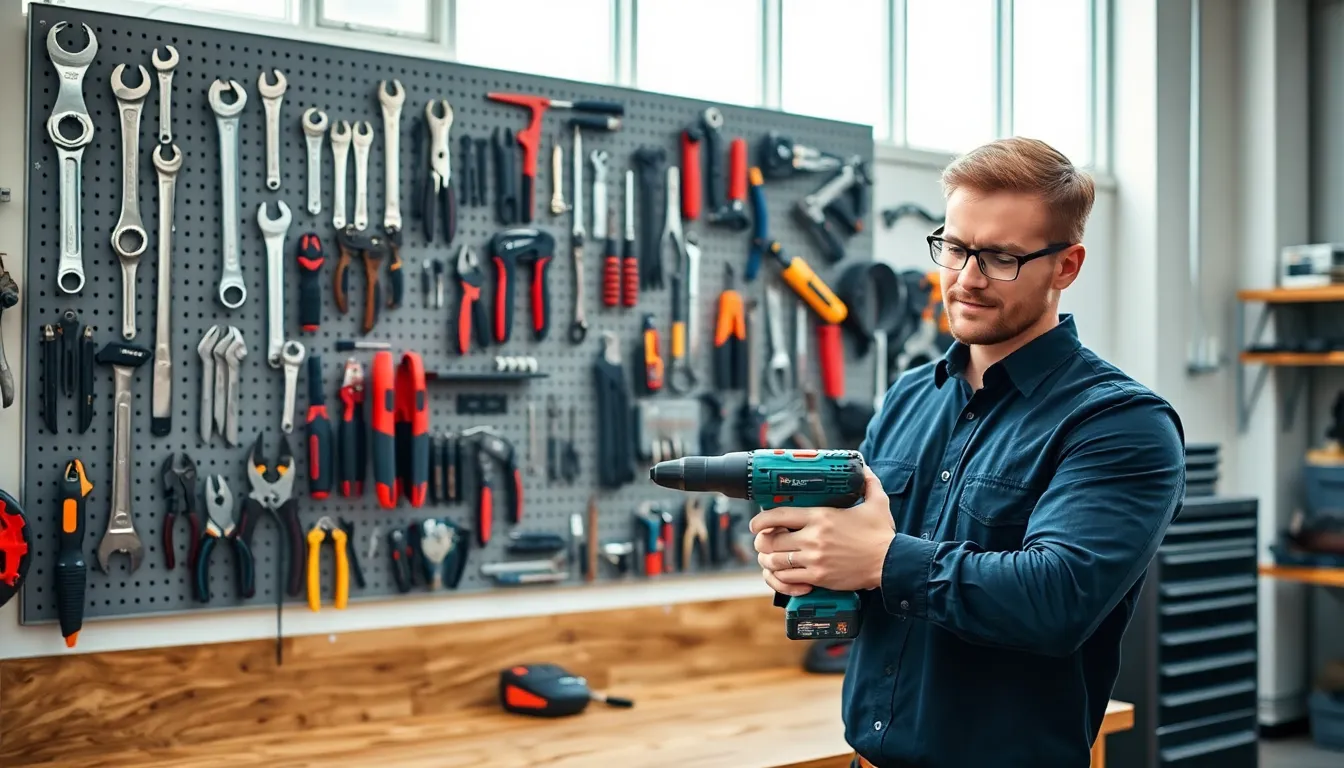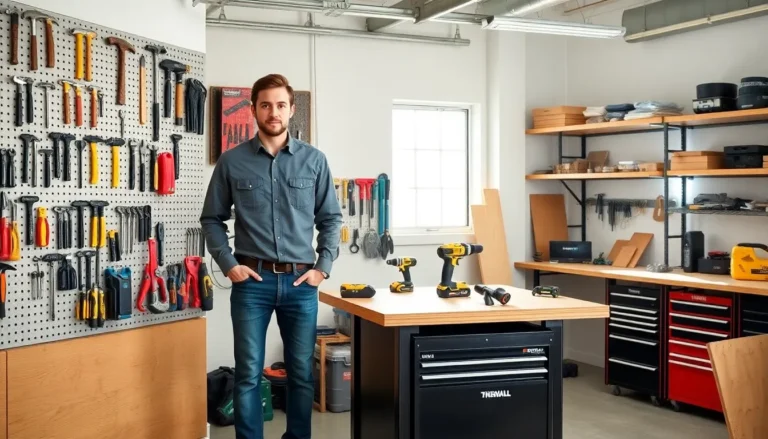Welcome to the world of mechanical workshop tools. Whether you’re a DIY enthusiast or a seasoned pro, having the right tools can make a world of difference. Picture this: you walk into your workshop, and instead of hunting for that elusive wrench or screwdriver, you find everything neatly organized and ready to go. Wouldn’t that just make your day? In this guide, we’ll jump into the essential tools every mechanical workshop needs, sprinkle in some expert tips, and maybe even have a laugh or two along the way. So grab your tool belt, and let’s get started.
Table of Contents
ToggleEssential Hand Tools for Mechanical Workshops

Mechanical workshops thrive on a solid foundation of hand tools. These trusty companions are indispensable for a variety of tasks, ranging from simple repairs to intricate assembly.
Here are the star players you should consider:
- Wrenches: Adjustable wrenches and socket sets are like the Swiss Army knives of any workshop. They can tackle almost any nut or bolt that comes their way.
- Screwdrivers: A good set of screwdrivers (both flathead and Phillips) is essential. If you’ve ever tried to assemble IKEA furniture with a lousy screwdriver, you know the pain.
- Pliers: Needle-nose pliers are perfect for those tight spots, while locking pliers can hold pieces together when you need an extra set of hands.
- Hammers: You can’t go wrong with a few different hammers. A rubber mallet for delicate jobs and a claw hammer for good old-fashioned nail-driving can save the day.
- Measuring Tools: Get accurate measurements with calipers and tape measures. Nothing says “I’m prepared” like being able to measure twice and cut once.
- Cutting Tools: Utility knives and snips are essential for cutting through various materials, ensuring you have the right tool for the job.
By assembling these essential hand tools in your workshop, you not only improve your efficiency but also tackle projects with confidence.
Power Tools: Enhancing Efficiency and Precision
Power tools have revolutionized the way work gets done in mechanical workshops. They’re not just fancy gadgets: they’re efficiency machines designed to make tough tasks easier and more precise. Here’s a glimpse into some must-have power tools:
- Drills: Cordless drills are versatile and allow for flexibility when working on different surfaces. These little wonders can help you tackle everything from hanging shelves to building furniture.
- Angle Grinders: Perfect for cutting, grinding, or polishing materials, angle grinders can save hours of hard labor. Use it for metal, tile, or even concrete.
- Saws: A good band saw or circular saw can make quick work of cutting through wood and metal. Whether you’re creating intricate cuts or making straight lines, these tools deliver.
- Sanders: From orbital sanders to belt sanders, these tools give your projects a professional finish without the hassle of hand-sanding.
- Compressors: Pneumatic tools powered by air compressors can perform tasks faster and more efficiently. Think nail guns or air wrenches that make fixing decking or installations a breeze.
Integrating these power tools into a mechanical workshop can vastly improve productivity, enabling craftsmen to achieve results they previously only dreamed of.
Specialized Tools for Different Applications
In the world of mechanical workshops, one size does not fit all. Specialized tools cater to unique applications, allowing for greater precision and efficiency in various tasks. Here are some examples:
- Torque Wrenches: These babies help achieve the perfect tension on bolts, an absolute must if you’re working on anything automotive.
- Impact Wrenches: Designed for high-torque applications, impact wrenches save time and energy when fastening or loosening bolts.
- Automotive Diagnostic Tools: For vehicle maintenance, using OBD-II scanners to read diagnostic codes can simplify troubleshooting and repairs.
- Precision Measuring Tools: Tools like micrometers and dial indicators ensure accurate measurements, vital for high-stakes jobs in engineering or machining.
- Woodworking Tools: If wood is your medium, specialized tools such as routers or jointers can elevate your craftsmanship.
These specialized tools not only enhance functionality but also elevate the quality of the workshop’s output.
Maintenance and Care of Workshop Tools
Maintaining workshop tools is crucial for longevity and performance. Just like cars need regular oil changes, tools require care to function correctly. Here are some best practices:
- Clean Tools Regularly: Dirt and grime can lead to corrosion. After each use, take a moment to wipe down tools, especially power tools that can get gunked up.
- Sharpen Edges: Cutting tools lose their edge over time. Regularly sharpening blades not only improves performance but keeps projects efficient.
- Store Properly: Invest in high-quality storage solutions. Using toolboxes, pegboards, and organizers keeps tools accessible and in good condition.
- Lubricate Moving Parts: For power tools, regular lubrication prevents rust and ensures smooth operation. A little oil can go a long way.
- Inspect for Wear: Routinely check tools for signs of wear or damage. Identify worn-out components before they fail mid-project.
Proper maintenance practices not only save time and money but also keep projects running smoothly.
Safety Practices When Using Workshop Tools
Safety should always come first when working in a mechanical workshop. Armed with tools, one can accomplish incredible things, but it’s crucial to respect their power. Here are essential safety practices:
- Wear Personal Protective Equipment (PPE): Safety glasses, gloves, and ear protection are must-haves for any workshop. A bit of prevention can prevent accidents.
- Keep the Workspace Organized: A clean workspace minimizes hazards and distractions. Ensure tools are stored properly and remove any clutter before beginning work.
- Read Manuals and Safety Guidelines: Don’t skip the manuals. Each tool comes with specific instructions. Familiarize yourself to avoid potentially dangerous mistakes.
- Use Tools as Intended: Every tool has its purpose. Using them incorrectly can lead to serious injuries.
- Know Emergency Procedures: Always be aware of emergency exits and keep a first-aid kit readily accessible. It’s good practice to know how to react in case of an accident.
Following these safety practices helps ensure a safe and productive workshop environment.
Future Trends in Mechanical Workshop Tools
As technology advances, the landscape of mechanical workshop tools continues to evolve. Future trends suggest exciting developments:
- Smart Tools: Imagine tools equipped with sensors that provide feedback on usage or performance. These can aid in precision and alert users to potential safety issues.
- Battery Innovations: With advancements in battery technology, power tools are becoming more efficient, lightweight, and long-lasting.
- Sustainability: An eco-friendly approach to tool manufacturing is gaining traction. Tools made from recyclable materials are becoming popular as workshops aim for a sustainable future.
- Automation: Automated tools and machinery are on the rise, allowing for increased efficiency and consistency in intricate tasks.
- 3D Printing: This revolutionary technology is allowing craftsmen to produce customized tools or parts on-demand, transforming the way workshops function.
Embracing these future trends can put workshops at the forefront of innovation, leading to improved outcomes and efficiency.



